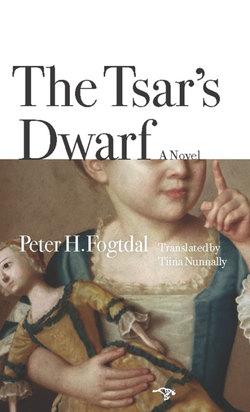Читать книгу The Tsar's Dwarf - Peter H. Fogtdal - Страница 14
На сайте Литреса книга снята с продажи.
7.
ОглавлениеDUSK SETTLES OVER THE HARBOR LIKE A SHADOW. IT slips quietly through the sports hall, the rope works, and the windows of the castle. The last rays of the sun cling to the church towers, dance across the red rooftops, slide over the ramparts, and disappear. But the sun will be back. Everything repeats itself. Everything repeats itself.
Outdoors the city prepares for the night, for the arrival of the stars.
My life is about to change soon; there is nothing I can do about it. Everything is out of my hands. That ought to make me feel calm, but I’m anything but calm.
I look at the congenial notarius publicus—or rather, the apparently congenial notarius publicus, because no one can truly know a human being. No one has any desire to know a human being.
Rasmus Æreboe keeps on talking about his days in Russia—how cold and raw it was, how everything froze solid during the long winters: the rivers, the poultry, the Hungarian wine. He talks about the barbaric inhabitants, about the funereal language that sloshes in the mouth like pea soup.
I watch Æreboe. I see how his eyes grow bigger when he speaks of the beautiful Church of the Ascension in Moscow, after which the cake has been modeled; about the flickering of the pine torches over the nighttime snow; about the decorated sleighs that were pulled by Siberian tigers. And suddenly I have the feeling that Æreboe could keep on this way for hours, that he can’t be stopped once he gets started. The past turns to tears in his eyes as he speaks of the mighty tsar, who is both cultivated and barbaric. A giant of a man who can drink any foreigner under the table, an awe-inspiring despot who keeps a collection of molars he has pulled from the mouths of his own soldiers. And the more Æreboe talks, the more I have the impression that he’s bored in Denmark, that he misses the frozen steppes of Russia. And I wonder yet again what a notarius publicus actually does. Maybe it’s a post that is just as dreary as it sounds.
“Nowadays I work at the stock exchange, so there’s no time to keep up my Russian,” says Æreboe, as if he could read my mind.
I nod.
“But right now the plan is for me to teach you a song or several verses of poetry that you can recite for His Majesty the Tsar.”
“I refuse to sing.”
“At least you can read the words.” Æreboe gives me an encouraging smile. “I’ll write the words down, and then I’ll teach you how to pronounce them.”
“In Russian?”
“Yes, in Russian. And believe me, it’s a beautiful language.”
The strange notarius sets about writing down a sentence. There is something about him that I like. That may be because I don’t know him. His eyes shine with childish joy. His quill pen scratches across the page.
I ponder what the Muscovites’ tsar intends to do in Denmark, and whether it’s true that he wants to help the king reclaim the territories of Scania. The Danes and the Muscovites are allies. They’re preparing a raid on Sweden to undermine Karl XII, the warrior king. And I’m supposed to jump out of a cake. How unfair history can be.
“Dobro poshalovalot’. Vashe velichestvo, v prekrasnuyu datskuyu zemlyu…Can you say that?”
I repeat the strange sentence: “Dobro poshalovalot’. Vashe velichestvo, v prekrasnuyu datskuyu zemlyu…”
“Excellent. You have an ear for languages.”
I nod. There’s a special music to this language—something explosive that is provocative and so unlike Danish. I feel an urge to say the sentence again, but I can’t remember the words.
The notarius smiles.
“Dobro poshalovalot’. Vashe velichestvo, v prekrasnuyu datskuyu zemlyu…”
“What does vashe mean?”
“It doesn’t matter.”
I look at Rasmus Æreboe. A new strength has emerged on his face, as if he were deriving something from the language that he couldn’t get from his native tongue. His gaze is firmer, his voice deeper. The more Russian he speaks, the more the sweat pours from his brow. His jaw gets wider, the movements of his lips look unfamiliar and grotesque.
With my dwarf vision I see the tsar’s city before me. Not Moscow but Petersburg. A city with canals and windblown palaces. A site surrounded by icy green islands and poisonous swamps, with beautiful bridges and yellow mansions.
“…v prekrasnuyu datskuyu zemlyu…”
I watch the lips of the notarius and wait tensely for the new sounds they will produce.
In the meanwhile, time flies by. That’s good. Almost too good to be true.
